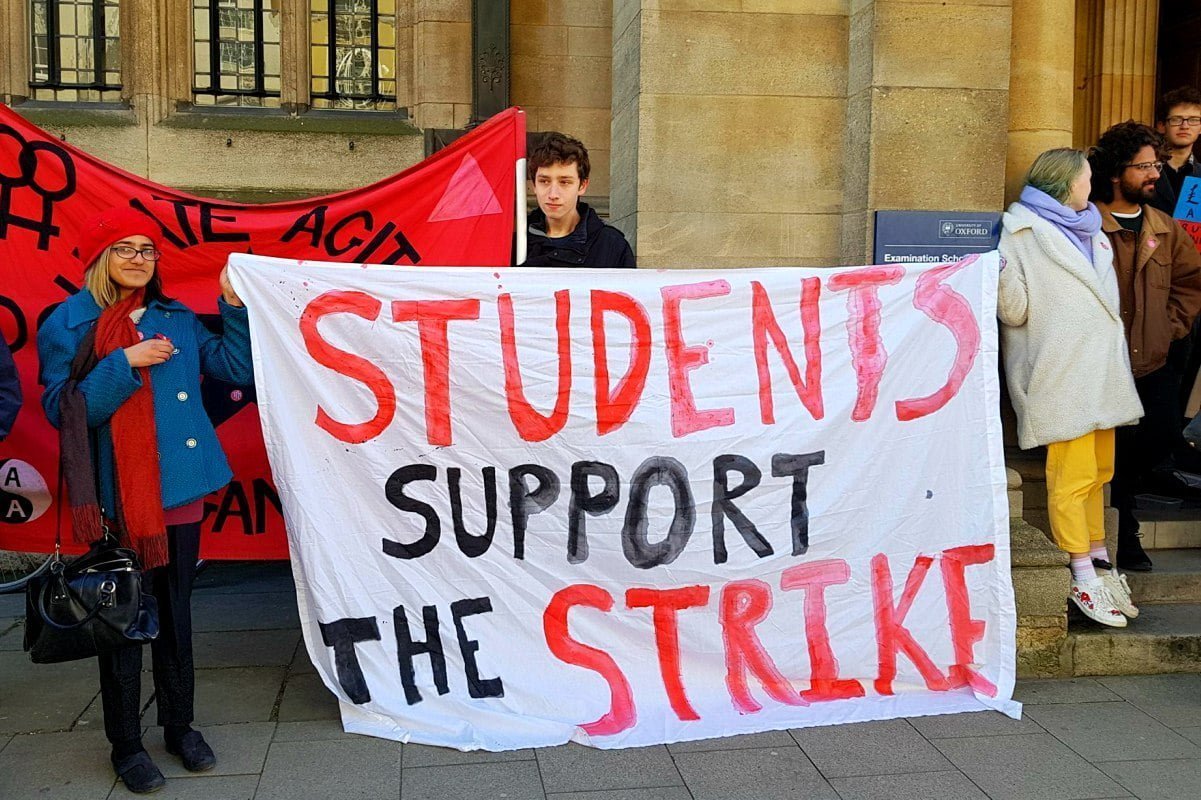Rui, a UCU member at Oxford University, describes how the lecturers’ strike has developed and grown over the past few weeks. Momentum is with the workers. The union leadership must not waste this with a criminal sell out.
Academic and academic-related staff at universities all over the country have been participating in the most militant strike action ever called by the University and College Union (UCU) in response to the proposed changes to their pension scheme.
The overall strength of the action nationally has been impressive. And the strike at Oxford University has been no exception.
Despite the often inclement weather, staff have turned up en masse to the picket lines, with numbers increasing day by day. Due to the geographical spread of the university, pickets have been set up at various points across the city. But large numbers have allowed for more picket lines than ever before, with new locations being added every week. Last-minute pickets organised by UCU members have sprung up in front of their own departments.
Many of the workers taking action are striking for the first time – some worked during the last UCU strike. This time they believe the employers have gone too far.
There has been a visible participation of young early-career staff. The cuts to pensions would hit these workers harder. And they are also the most casualised layer. These workers link the pensions issue with that of precarious conditions of employment and the lack of prospects for their future careers.
Many express concern for the changes brought about to universities by the marketisation drive. This sees education and research as commodities; students as customers; and justifies attacks on working conditions in the name of maximising profits.
In fact, precarious conditions have acted to keep some staff away. Several non-striking workers stopped at the picket lines to express their support, but apologised for not joining, often for fear of losing their job at the end of their fixed-term contracts.
Colleagues employed by colleges (not covered by the strike action) have joined pickets and rallies in solidarity. We have also received similar support from staff represented by Unison or from Oxford Brookes.
Above all, we have seen an impressive show of solidarity from students. Lots have stood with striking staff, joining the picket lines every morning, bringing banners, chants, songs, and poems.
Oxbridge’s malicious influence
 As the strike grew, news transpired of Oxbridge’s undue influence in the process. Both staff and students here at Oxford were angered to learn of our university’s leading role in bringing about the proposed cuts to pensions.
As the strike grew, news transpired of Oxbridge’s undue influence in the process. Both staff and students here at Oxford were angered to learn of our university’s leading role in bringing about the proposed cuts to pensions.
The mood was such that university management felt the need to issue a carefully worded “reassurance” to its staff that “Oxford, either on its own or with Cambridge, did not exert disproportionate influence on the process to date”. This conspicuously forgot to mention what position the university and the colleges took on the issue or how their votes were counted.
As it happens, a number of tiny, wealthy Oxbridge colleges were given the same weight as large universities in a key survey used by UUK to define changes to the pension scheme. Most took a hardline position, voting to minimise their risks at the expense of their employees’ benefits. An estimated 16 colleges were counted, in addition to the two universities themselves, amounting to a third of the hardliners. Moreover, their positions were decided in secret, without consulting their staff.
In response to this, a group of academics submitted a motion to Congregation, the university’s parliament-like body, comprised of tenured academic and senior administrative staff. It proposed to modify the university’s response to the survey, allowing the pension scheme to remain unchanged.
To overcome a formality relating to notice time, a procedural motion was necessary to allow the resolution to be debated. But this could be defeated by just 20 members standing to oppose it.
In the build-up to the Congregation meeting, the VC (Vice-Chancellor) launched a shameless campaign to find 20 stooges willing to stop the debate. Paradoxically, this attempt to silence staff was dressed up by the VC as concern for democracy.
Rebellion
Congregation met on 6th March. The theatre was packed with hundreds, while a massive and very loud crowd of students and non-represented staff gathered in the street outside. Most members remained steadfastly seated, while a tiny minority of senior managers stood to oppose the procedural motion.
Officials counted 21 people standing and announced that the resolution on pensions could not be heard. This was met with boos and cries of protest. Many left the room immediately and we could hear their invectives at management as they walked outside.
Rejecting management’s proposal of a consultative conversation, the movers of the resolution decided to hold a symbolic vote in the courtyard. It was passed by an overwhelming majority (419 votes for, 2 against).
Congregation members left to the street outside as they voted. They greeted the crowd, thanking the students for their support, some with an arm raised and a clenched fist. The speeches in support of the resolution, originally prepared to be read at the meeting, were then given to those assembled outside.
You could cut the atmosphere in the air with a knife. The mood of anger at university management was palpable among those leaving the theatre or standing outside.
Later in the day, Oxford UCU president Garrick Taylor shared an email he received: “after what happened just now in Congregation, I would like to join the strike”. This sentiment was shared by many others.
This fight had gone beyond the pensions issue and turned into a question of how the university should be run – i.e. by whom and in whose interest. Management was silencing any semblance of democratic representation and accountability in order to pursue their business agenda against both workers and students, as had previously happened over the tuition fee hike. A furious crowd chanted a menacing “We’re not done!”
Management was on the back foot. Their attempt at controlling the vote had backfired, serving only to strengthen the hand of the striking workers. Numbers increased, as did the strength of feeling and determination.
By the next morning, the Vice-Chancellor (who had not even deigned to show up at Congregation) had sent an email to all staff effectively admitting defeat. The resolution was carried and Oxford University reversed its position to accept a higher level of risk. And management recognised that they had mishandled the situation. Several Oxford colleges later issued similar statements.

Protest today outside UCU headquarters in London against the sell out deal being proposed
#NoCapitulation
This was clearly a big victory and a turning point in the pensions dispute. After a strong showing, with widespread student support and solidarity, the UUK had been pushed back into negotiations. Now, one of the institutions most forcefully pushing for cuts to pensions had been forced to reverse position. The other, Cambridge, was expected to follow suit.
UCU members in Oxford and across the country feel energised, with momentum clearly on our side. More and more workers have been joining the strike and there was a clear feeling that we could win.
Against this backdrop, the “deal” proposed by the UCU leadership – in effect, an outright capitulation – feels like a rug being pulled from under our feet.
Indeed, this looks like a deal designed by UUK precisely to take the momentum out of the strike action, without actually conceding anything but a vague commitment to a “meaningful level of defined benefits” (whatever “meaningful” means)…for a grand total of three years.
We have the potential to score a victory – not just on pensions, but on the broader fight against the marketisation of higher education and scientific research. This issue underlies both the exorbitant student fees, which saddle students with debt, and the casualisation of staff, who face massive cuts and increasingly precarious conditions. Meanwhile, vice-chancellors and senior management pocket six-figure salaries to turn universities into businesses.
Instead, our union leadership wants us to accept a cut on pensions with the potential of further cuts in three years’ time – and to be left demoralised in the face of what even they seem to accept as an unavoidable road to further casualisation.
We must reject this deal and fight to the finish!






